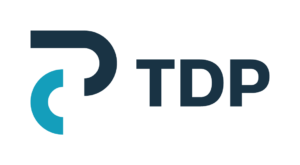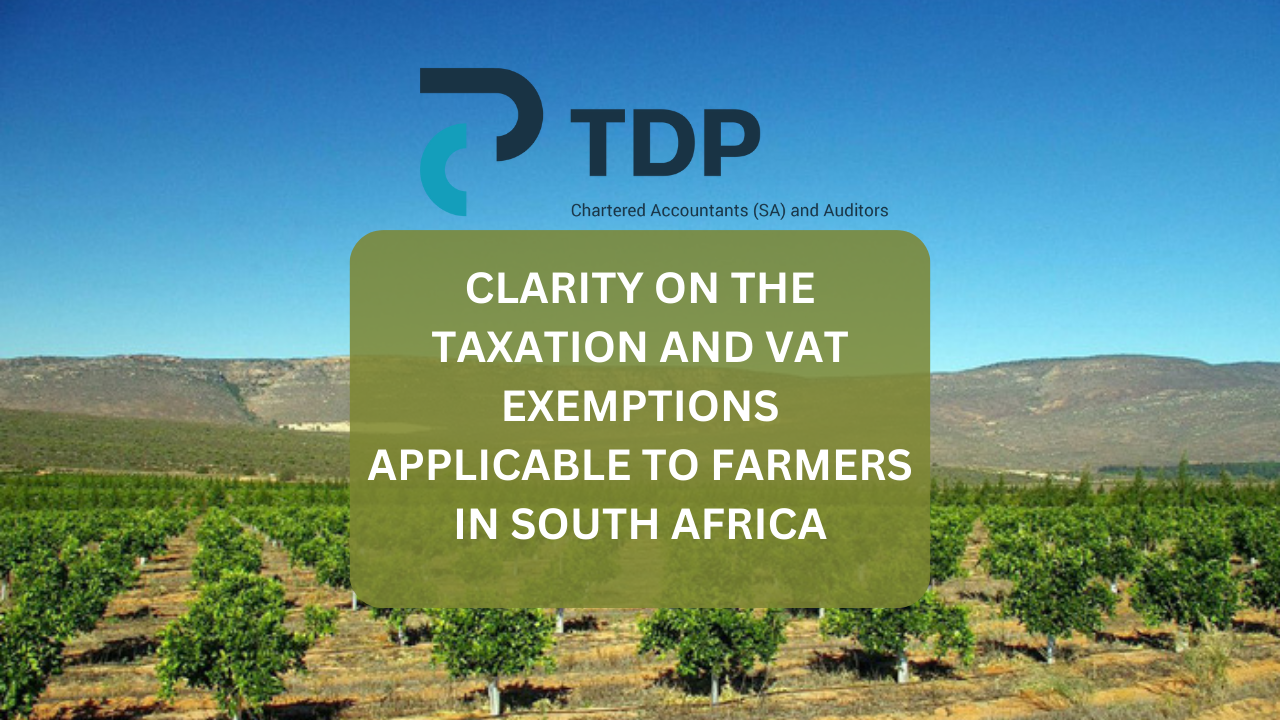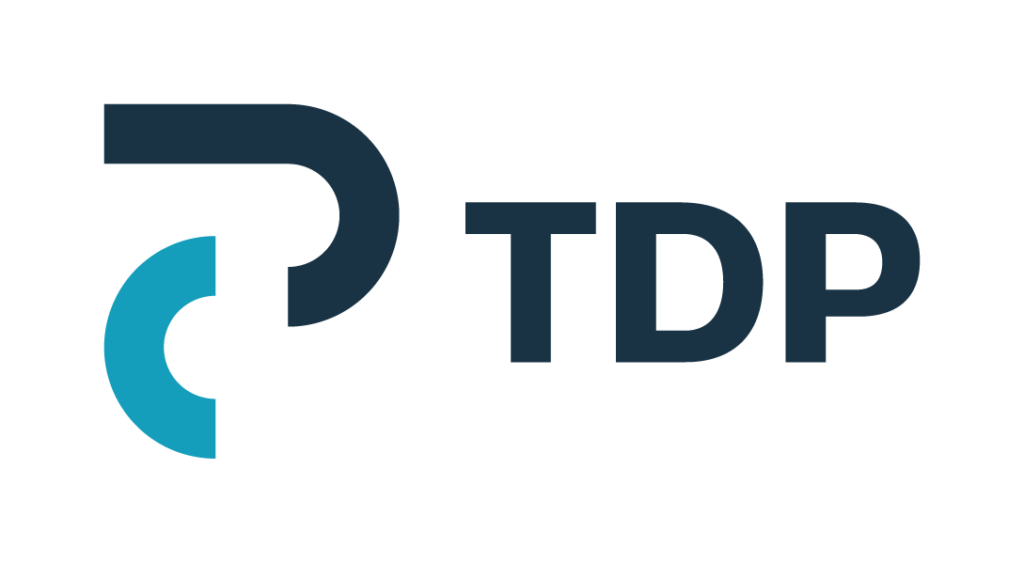CLARITY ON THE TAXATION AND VAT EXEMPTIONS APPLICABLE TO FARMERS IN SOUTH AFRICA Agriculture and farming constitute the backbone of any economy. It is unsurprising that the Income Tax Act 58 of 1962 (the Act) outlines specific and advantageous regulations for farmers in South Africa. These unique tax rules are primarily detailed in the First Schedule of the Act. The publication of the SARS Draft Guide on the Taxation of Farming Operations on 22nd September 2022 (the Draft Guide) would likely have been welcomed by farmers. Prior to this, the South African Revenue Service (SARS) had not provided a comprehensive explanatory document or guide for the First Schedule. This article explores key guidance notes found in the Draft Guide. Definition of Farming Operations For the special tax regulations in the First Schedule to be applicable, several conditions must be met. Arguably, the most crucial requirement is that the individual must be “engaged in pastoral, agricultural, or other farming operations.” This is significant because only taxable income derived from these operations falls under the special taxation regime. While ultimately, it is a matter of fact to determine if an individual is indeed engaged in pastoral, agricultural, or other farming operations, SARS’ Draft Guide suggests that “other farming activities” typically encompass undertakings like horse breeding, fish farming, and beekeeping. The Draft Guide elaborates on various legal cases related to the definition of “engaged in pastoral, agricultural, or other farming operations.” For instance, it mentions a case where a grower who intended solely to sell surplus crops was not deemed to be engaged in farming operations. Thus, the Draft Guide confirms that one must conduct a trade in farming with an overall profit-making intention. Another important issue considered in the Draft Guide is the scenario involving two parties: one owning the land where farming operations occur, and another conducting these operations. Ultimately, it depends on the facts to determine which party qualifies as “farming” and benefits from the special taxation regime. If a person leases land from another entity where they physically conduct farming operations, the one physically conducting the operations is generally regarded as the farmer. According to the SARS Draft Guide, the landowner isn’t involved in farming operations because their income arises from land ownership rather than farming operations. Interestingly, the Draft Guide suggests that if rental payments were based on a percentage of the proceeds from vineyard activities, the landowner might apply the First Schedule to determine taxable income derived from farming. It is worth noting that only income “derived from farming” falls within the special tax regime outlined in the First Schedule. This means not all income from farming automatically falls under the First Schedule; there must be a connection between the income earned and farming operations. Examples of “supplementary farming operations” provided in the Draft Guide include selling manure, firewood, letting grazing rights (if rental comes from farming proceeds), selling plantation and forest produce, prize money (e.g. for best wool or largest pumpkin), or compensation from the government for livestock destruction due to disease. Conversely, the Draft Guide states that activities like fruit packing for other farmers, winnings from horse racing where the farmer bred the horses, and accommodation and catering services for people spending holidays on the farm do not qualify as farming activities. In such cases, normal tax principles apply to that income. Valuation of Opening and Closing Stock Another important aspect discussed in the Draft Guide is the calculation of opening and closing trading stock for farmers, including livestock and produce. Notably, the Draft Guide confirms that consumable stores for farmers (e.g., fuel and spares used for farming equipment) and non-livestock or non-produce items do not need to be considered as closing stock for First Schedule purposes. The Draft Guide also talks about using standard values for livestock, except game livestock, established by regulations. Farmers can choose a different value (other than the standard value), as long as it is not more than 20% higher or lower than the standard value set by regulations. If a farmer opts for a different value, they are bound by that choice and cannot alter it. The valuation of stock and produce is, therefore, a significant taxation concept for farmers. Deduction of Capital Expenditure In general, capital expenses cannot be deducted from income unless one of the special capital allowances in the Act applies. However, one of the most advantageous aspects of the First Schedule to the Act, pertaining to farming operations, is that paragraph 12 provides a special provision for farmers to deduct specified capital expenses. Paragraph 3.6.1(b) of the Draft Guide discusses some of the capital development expenses that can be claimed under paragraph 12 of the First Schedule. This includes expenses related to eradicating noxious plants and alien invasive vegetation, preventing soil erosion, dipping tanks, dams, irrigation schemes, boreholes, pumping plants, fences, and erecting or improving buildings used for farming operations (excluding those for domestic purposes). Importantly, the Draft Guide also addresses the deduction of costs related to the construction of roads, bridges, and electrical infrastructure. However, not all infrastructure expenses will necessarily fall under paragraph 12 of the First Schedule, as it must be demonstrated that the roads and bridges are used in connection with farming operations. Electrical infrastructure costs must be predominantly (more than 50%) used for farming purposes and not also for the farmer’s domestic premises. Zero rating and Exemption upon Importation of certain Goods The VAT Act provides special dispensations to a vendor that carries on agricultural, pastoral or other farming activities (farming enterprise). The first dispensation allows a vendor that carries on a farming enterprise to acquire certain goods at the zero rate or import certain goods exempt from VAT. These goods must however be used or consumed in the course of conducting a farming enterprise. The intention of this dispensation is to assist a vendor that carries on a farming enterprise with their cash flows. Some of the goods that may
FUEL LEVY EXEMPTION EXTENDED TO FOOD MANUFACTURERS
In his 2023 Budget Speech, Finance Minister Enoch Godongwana announced a significant development aimed at mitigating the effects of the energy crisis and load shedding on South African businesses. Starting from April 1, 2023, until March 31, 2025, the existing diesel refund scheme, previously applicable primarily to primary sectors such as farming, forestry, fishing, and mining, will be extended to encompass food manufacturers. The diesel refund system, initially introduced in 2000, provides relief in the form of partial or full exemption from the general fuel levy and the road accident fund levy for primary sectors. This extension seeks to alleviate the burden of load shedding on food prices by granting manufacturers of foodstuffs the opportunity to claim refunds for distillate fuel used in combating the effects of load shedding. Under this new provision, the South African Revenue Service (SARS) will administer an 80% refund of the Road Accident Fund (RAF) levy for diesel purchased and utilised in the manufacturing of foodstuffs through the DA66 Excise Refund System. It’s important to note that this process will be automated in the last quarter of 2023 and is distinct from the diesel refund system managed through the VAT system via VAT 201 returns. Contrary to some expectations, food manufacturers will not receive full relief; instead, they will benefit from an 80% refund of the RAF levy, which currently stands at R2.18 per litre of 95 petrol. Despite the refund, food manufacturers will still incur a cost of 44 cents per litre towards this tax. Accessing and Claiming Under the Diesel Refund Scheme Qualifying entities engaged in eligible activities and registered for VAT purposes may apply for registration under the Diesel Refund Scheme. Most farming enterprises, as a qualifying activity, are eligible for this scheme. Those involved in farming must initiate the application for Diesel Refund Scheme registration. For entities already registered as VAT vendors engaged in farming, registration for the Diesel Refund Scheme can be accomplished by submitting a VAT 101D form. However, if a farming enterprise is NOT currently registered as a VAT vendor, applications for both VAT registration and registration under the Diesel Refund Scheme must be submitted concurrently. To claim a diesel refund under the Diesel Refund Scheme, the VAT 201 return is employed for processing. Diesel refund claims are offset against any VAT liability for the relevant tax period or, alternatively, may increase any VAT refund due to the vendor. Proper record-keeping is crucial, with all relevant documentation related to diesel purchases and logbook entries or records indicating the amounts of diesel utilized for eligible and non-eligible purposes retained for a period of two years. Limitations to the Scheme Nonetheless, there are certain limitations to the scheme worth noting: As a result, affected taxpayers are advised to assess their eligibility for the refund and prepare to navigate the necessary systems and procedures accordingly. For expert guidance on the Diesel Refund Scheme, please contact Jaco at 041 4508799 or send an email to jaco@pe.tdp.co.za.
THE ECONOMIC IMPACT OF MENTAL HEALTH IN SOUTH AFRICA
THE ECONOMIC IMPACT OF MENTAL HEALTH IN SOUTH AFRICA Introduction On this World Mental Health Day, we find ourselves compelled to delve into a matter of paramount importance that often goes unnoticed – the economic impact of mental health in South Africa. Mental health conditions, such as depression and anxiety, have far-reaching consequences that extend beyond the individual’s well-being; they have a substantial impact on the economy, costing an estimated R161 billion per year due to lost workdays, presenteeism, and even premature mortality. In this blog post, we will explore the alarming statistics, discuss the financial stress faced by many South Africans, especially women, and highlight the critical need for addressing mental health issues in the workplace. The Mental Health State of South Africa In the Mental State of the World report for 2022, South Africa scored the lowest average, indicating a widespread mental health crisis within the nation. This report serves as a stark reminder that mental well-being is a crucial aspect of overall health, one that is often overlooked in our fast-paced world. The Second Annual Money Stress Tracker To further shed light on the economic implications of mental health in South Africa, we turn our attention to the findings of the second annual Money Stress Tracker, released in July 2023. This extensive survey, conducted with over 35,000 subscribers of the debt counselling company, DebtBusters, paints a worrying picture. The survey reveals that a staggering three out of four South Africans are grappling with money-related stress, representing a disturbing 12 percent increase from the previous year. The Gender Disparity One of the most distressing aspects of these findings is the gender disparity. Women, in particular, are bearing the brunt of financial stress, which is not only affecting their personal and professional lives but also their overall health. This disparity underscores the need for gender-sensitive approaches to addressing mental health and financial well-being. Financial Stress Across Income Levels It’s crucial to note that financial stress does not discriminate based on income levels. While lower-income earners may face more acute financial challenges, higher-income individuals are not immune. Many South Africans, irrespective of their income, find themselves drowning in unsustainable debt, exacerbating their mental health concerns. Presenteeism: A Silent Crisis in the Workplace Perhaps the most concerning aspect of unaddressed mental health conditions is their impact on the workforce. Professor Renate Schoeman, head of healthcare leadership at the Stellenbosch Business School, rightly points out that presenteeism is a more significant problem than absenteeism in South Africa. This phenomenon is observed not only among lower-income workers who fear losing their jobs due to “no work, no pay” policies but also among executives who feel the need to always appear strong and capable. Professor Schoeman highlights the indirect costs linked to mental health in the workplace, stressing that people often refrain from seeking necessary mental health support out of fear of job loss. This reluctance to seek help perpetuates the cycle of mental health challenges and further exacerbates the economic impact. The Psychological Toll of Financial Woes Diane Salters, a renowned psychotherapist and transactional analyst, emphasises the profound psychological impact of financial woes. Individuals facing severe debt threats often experience feelings of shame and fear, which impair their decision-making abilities. These emotions can trigger the fight, flight, or freeze responses, making it even more challenging for individuals to address their financial issues effectively. The Deep Connection Between Financial Stability and Mental Health Shafeeka Anthony, Marketing Manager of JustMoney.co.za, aptly underscores the deep connection between financial stability and mental health. Money worries can indeed lead to severe mental health issues and, in some cases, even push individuals to contemplate suicide. It is imperative to recognise and address this connection, especially in the midst of challenging economic times. Outsourcing Financial Stress: The Role of Accountants In light of these challenges, it becomes evident that individuals and businesses need effective strategies to manage their financial stress. Small business owners, in particular, face unique pressures. Fortunately, there are six areas where qualified accountants can make a significant difference: 1) Admin: Delegate the paperwork to a professional business accountant who can handle payroll, work comp audits, and HR issues. 2) Feeling Responsible for Company’s Success: Seek guidance from a trusted business advisor who can provide perspective and help you make informed decisions. 3) Compliance: Stay on top of dynamic compliance issues by relying on certified professionals who can deliver insights tailored to your needs. 4) Overhead & Expenses: Review monthly financial statements compiled by a professional to understand where your money is going and make informed changes. 5) Filing Taxes: Don’t stress about tax season; proactive tax planning and adjustments throughout the year can eliminate surprises. 6) Time Management: Delegate accounting, tax, and payroll tasks to local small business experts, freeing up your time for strategic business activities. Conclusion In conclusion, the economic impact of mental health in South Africa is significant and far-reaching. The findings from the Money Stress Tracker survey underscore the urgent need for addressing financial stress and its profound connection to mental health. It is imperative that individuals and businesses alike recognise the importance of seeking professional assistance, particularly from qualified accountants who can alleviate financial stress and contribute to better mental well-being. At TDP PE, we are committed to working with you to navigate these challenges. Our monthly financial statement compilation, professional insights, and proactive tax planning can provide the support you need to make informed decisions and, ultimately, lead to better sleep at night. On this International Mental Health Awareness Day, let us collectively strive for a healthier South Africa, where economic well-being and mental health go hand in hand.




